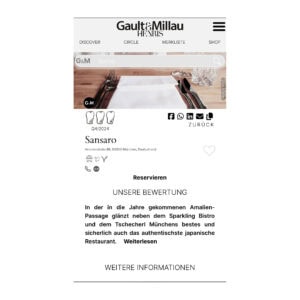Fortunately, the Corona crisis is now also rekindling the discussion about VAT, which has already been "on the agenda" of the catering industry for many years. There are a wide variety of opinions on this, most of which are all well-intentioned, but some of which are uninformed or only cover different sub-sectors of the very diverse catering industry. Due to a Commentary in the Süddeutsche Zeitung and one Video contribution from quer - both media we hold in high esteem - here is a comment from us on this topic.
We would be very pleased if you Petition of the DEHOGA support, because in the long run, the issue of VAT in the restaurant industry is a make-it-or-break-it for a good, individual restaurant industry.
COMMENTARY ON THE DISCUSSION ABOUT ADDITIONAL TAXES IN THE GASTRONOMY SECTOR DURING CORONA BY ALEXANDER REINELT, MUNICH
The Opinion at Noon "Hotel and hospitality industry's demands go too far" by Ms. Gammelin dated April 20, 2020. I find Painfully uninformed and dangerously shortsighted.
Anyone in the restaurant business today who does not focus on merciless cost optimization and does not present his guests with franchise concepts, cheap material or 08/15 has hardly any chance of surviving at all - even if the restaurant is well frequented and often fully booked. Especially if he also wants to comply with all laws and regulations. Talking about tax "gifts" misses the reality of most restaurants.
THERE IS HARDLY AN INDUSTRY THAT IS SO STRICTLY CONTROLLED FOR COMPLIANCE WITH ALL KINDS OF REGULATIONS AS THE CATERING INDUSTRY.
Particularly in the catering industry, with the prejudice of a supposed "tax evasion industry" that still exists from the past, the legislation on the minimum wage (and the associated recording requirements for working hours) and the justified need to comply with safe hygiene standards and health requirements for citizens, an enormous number of legal areas come together that burden the restaurateur with an unimaginable amount of administrative work. This work adds extremely to the overhead for small businesses - all of which is work time that also has to be done by someone who also has to get paid and make a living. It doesn't matter what culinary quality is put on the table and whether you use a lot of organic or comparable material - or convenience food off the shelf.
At the same time, every guest expects that only he - the guest - is in the focus of the restaurateur, and that all employees have to worry uninterruptedly only about the well-being of the guest. There is little understanding of the fact that the price of a meal or drink is used to pay not only for the goods purchased and a service, but also for a considerable amount of administrative work.
Small businesses in particular, which rely on complying as closely as possible with the comprehensive regulations in order not to get into a conflict with the supervisory authorities that could potentially threaten their existence, can only survive with great difficulty despite the 7-day week of those responsible. We have never heard of large companies such as BMW or fashion companies in and around Munich, where massive, unpaid overtime is sometimes the order of the day for years on end, being as tightly controlled as the catering industry often is. But the gastronome is constantly under the obligation to prove credible working time records, to document all possible processes, thereby constantly extremely vulnerable to attack, since a lot of work is done with cash. The list becomes endlessly long in detail, so that one does not even want to describe it here - in reality, however, it is exactly what is required.
Many simply lose the desire for this work. After all, these enormous personal burdens are often by no means offset by an appropriate salary for many restaurateurs, but often only by the joy of the work and of dealing with guests. The reality is that many restaurateurs were already bleeding out before Corona.
And then a German banker from London jets to Munich for the Oktoberfest and complains, after spending 55 euros on food & drinks for two people, that 7.50 euros for a bottle of water should be punishable (!) - all already experienced. The perception is, the landlord would slide the money all in.
The fact that from the net 6.30 euros the water, the rent, insurances, the personnel, whose health insurance, vacation and minimum wage must be paid, the professional association, the Gema, the broadcasting service, the wage tax and behind it again well 1-2 coworkers only for the organizational administration, in addition tax advisor and payroll accounting, does not arrive in the perception of the guest. Gastronomy, especially small and fine dining, is enormously labor-intensive and, so far, dramatically low-yielding. To talk here about tax giveaways being distributed to the restaurant industry is uninformed and wrong.
RESTAURANTS THAT OPERATE SUSTAINABLY OFTEN HAVE BALANCE SHEET PROBLEMS AND THUS APPEAR TO BE EXCLUDED FROM CURRENT ASSISTANCE
And there's more: many of the companies that try to do decent work, use good material, involve local suppliers and also want to give employees work-life balance, are struggling to survive precisely because of this sustainable approach and thus do not create a positive balance. Here the current promises of aid by the state and federal governments do not arrive. Anyone who has not been positive in total for the last three balance sheets will probably not receive an aid loan. As a result, countless companies that strive for quality and loyalty to the print run will fall behind, instead of only paying attention to profitability and perhaps fobbing off customers with cheap material. However, these businesses often make massive sales tax payments, employ correctly taxed and insured employees and thus also contribute to our social system.
However, with the previous tax and levy situation, there was hardly any chance for small businesses to build up reserves, continue to invest in sustainability or survive crises through no fault of their own.
DELIVERY SERVICES LESS SUSTAINABLE, BUT SIGNIFICANTLY MORE FISCALLY COMPETITIVE
It becomes completely incomprehensible when we look over the edge of our plate to the delivery services: they have to pay 12% less VAT for food that is mostly produced with the simplest possible effort, cheap materials and less qualified personnel.
A delivery service usually employs many temporary staff - a good restaurant these days has to seek good permanent employment, train its staff and often faces international competition for staff in the big cities or a rooted, local tradition in villages and the countryside. Already it is one of the biggest challenges to find employees at all in a city like Munich and then build continuity with them.
And during Corona we see it even more clearly: where in our restaurant we usually work with beautiful dishes, during the delivery service time there are tons of cardboard, plastic and even aluminum waste. Fiscally favored over the restaurants, but in the perception of customers, the prices are then in competition with each other.
This is not sustainable, neither for the environment, nor for the employment situation, and certainly not for a heterogeneous landscape of small farms that enrich their respective regions and have to manage very precisely themselves.
CORONA CRISIS AS A CHANGE FOR THE CHANGE OF ECONOMIC FUNDAMENTALS
In Bavaria, almost 500,000 jobs depend directly on a hospitality business - from the downstream, specialized suppliers not to mention. Almost 90% of these establishments generate less than 500,000 euros per year - but that is not profit for the restaurateur, but turnover, from which all costs and salaries are first deducted.
Gastronomy is diversity und eine kleinteilige, heterogene Gastronomielandschaft tatsächlich auch ein wichtiger regionaler Kultur- und Sozialfaktor. Es gibt auch ein öffentliches Interesse daran, dass diese Restaurants nicht reihenweise pleite gehen, dass nicht wie bisher schon vor Corona jährlich unzählige Gastronomen aufgeben und dass die Gastronomie eine Chance hat, wirtschaftlich zu leben auch wenn sie den Kunden hohe Qualität anbieten will.
It's time to give restaurants, which are already burdened many times over and many times over, another chance. A long-term fiscal equality of restaurant dining with the takeaway burger at McDonalds and the delivery pizza is overdue and an investment in sustainability.
Alexander Reinelt is the managing director of SUSHIYA GmbH and has been running the Japanese restaurant "sansaro" in Munich for over ten years.






